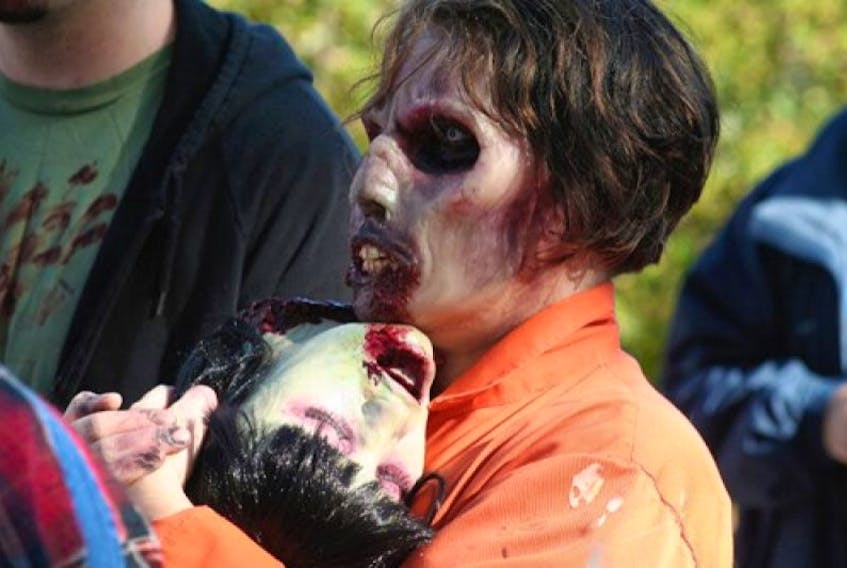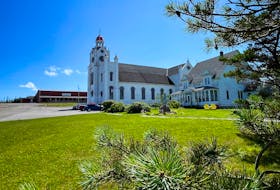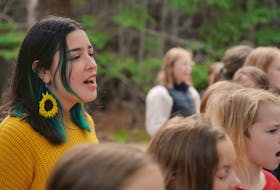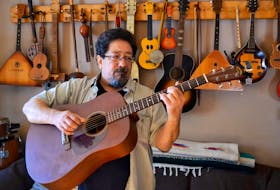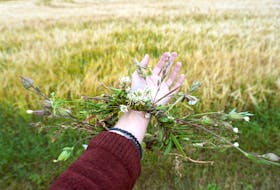“All of the things we do that we take for granted as being very normalized, they’re sometimes not so normal, if you’re coming from a culture outside North America,” said Maggie Peyton, a representative with the Association for New Canadians (ANC) resettlement team. “Halloween is a very North American holiday. Even in Europe it’s not something that’s usually celebrated.”
RELATED STORIES:
Grand Falls-Windsor Refugee Committee efforts successful
Iraqi refugees fared worse than others in first three years
If the holiday is celebrated, sometimes it does not involve trick-or-treating.
And so it’s worth considering for this evening just how scary you’d like to be.
“Some refugee families are coming from wars. So if someone shows up at your house wearing a lot of fake blood, it’s quite traumatizing. It can be,” the ANC rep said.
The Association for New Canadians staff and volunteers offer assistance to newcomers to prepare everyone for the holiday. The association’s daycare offers trick-or-treating between classrooms ahead of time, for example. “The children learn a lot about it in school and it’s kind of everywhere. Some families like to partake, so we try and connect them with costumes. Some families don’t want to celebrate it. And that’s OK too.”
The association has offered workshops tied in with popular Canadian holidays, like pumpkin carving for Halloween.
But a greater awareness within the community — a little consideration and a little patience in the case of language barriers — can also help. A phrase like “jack-o’-lantern” might need some explaining, for example.
Costumes can be helpful for next year. They can be donated at the Association for New Canadians donation centre at the former Booth high school.
The ANC said it’s worth considering other holiday elements, like backyard fireworks at New Years (the sound can be a trigger for refugees from war-torn areas), it is also worth asking about holidays your new neighbours may have celebrated back home but are less-known here, to help them feel considered and welcome.
‘It gets easier’
Once a refugee herself, coming to Canada from Kosovo in 1999 at age 8, Elbonita Kohzani is a nurse, Masters student and photographer. She is also friend to a newly arrived Syrian family with eight children, who are experiencing their first Halloween in Newfoundland and Labrador this year.
When it comes to the refugee experience, she said holidays can be an interesting if odd time, but kids always tend to get excited.
She remembers having her first Canadian Halloween. “It was so much fun,” she said.
Kohzani left Kosovo while still a child, but remembers quite a bit from her life there and from her time as a refugee, before her family settled in Canada.
There was her father’s small business, her home on the eighth floor of a large building, leaving home in just hours, escaping one place to another, the people having to shower in public in a poorly-resourced refugee camp, eating chocolate for the first time in months without knowing when she might taste it again.
She said she considers herself lucky, considering all she has been able to do since that time.
In mid-September, she was awarded $1,500 as a winner of a contest run by Scotiabank on Facebook, for the “Share Your Story” contest. She offered a brief piece on her refugee experience, offering advice to refugees and new immigrants.
“I don’t remember exactly what I wrote, but it was just something along the lines of: it’s going to be tough right now, learning the language, financially, you’re going to miss your friends and family like crazy and the life you knew back home and nothing’s really going to make sense at this point, but with time it gets easier.”
She offered one tip for something very simple that can be done by Canadians looking to welcome newcomers: “Say ‘hello.’ You have no idea the friendships you can make.”
Kohzani recently took to Facebook in search of costumes for her Syrian friends’ first Halloween. In speaking with The Telegram, she also endorsed the cultural information and community connections offered through the ANC.
RELATED LINK
www.scotiabank.com/newtocanada
“All of the things we do that we take for granted as being very normalized, they’re sometimes not so normal, if you’re coming from a culture outside North America,” said Maggie Peyton, a representative with the Association for New Canadians (ANC) resettlement team. “Halloween is a very North American holiday. Even in Europe it’s not something that’s usually celebrated.”
RELATED STORIES:
Grand Falls-Windsor Refugee Committee efforts successful
Iraqi refugees fared worse than others in first three years
If the holiday is celebrated, sometimes it does not involve trick-or-treating.
And so it’s worth considering for this evening just how scary you’d like to be.
“Some refugee families are coming from wars. So if someone shows up at your house wearing a lot of fake blood, it’s quite traumatizing. It can be,” the ANC rep said.
The Association for New Canadians staff and volunteers offer assistance to newcomers to prepare everyone for the holiday. The association’s daycare offers trick-or-treating between classrooms ahead of time, for example. “The children learn a lot about it in school and it’s kind of everywhere. Some families like to partake, so we try and connect them with costumes. Some families don’t want to celebrate it. And that’s OK too.”
The association has offered workshops tied in with popular Canadian holidays, like pumpkin carving for Halloween.
But a greater awareness within the community — a little consideration and a little patience in the case of language barriers — can also help. A phrase like “jack-o’-lantern” might need some explaining, for example.
Costumes can be helpful for next year. They can be donated at the Association for New Canadians donation centre at the former Booth high school.
The ANC said it’s worth considering other holiday elements, like backyard fireworks at New Years (the sound can be a trigger for refugees from war-torn areas), it is also worth asking about holidays your new neighbours may have celebrated back home but are less-known here, to help them feel considered and welcome.
‘It gets easier’
Once a refugee herself, coming to Canada from Kosovo in 1999 at age 8, Elbonita Kohzani is a nurse, Masters student and photographer. She is also friend to a newly arrived Syrian family with eight children, who are experiencing their first Halloween in Newfoundland and Labrador this year.
When it comes to the refugee experience, she said holidays can be an interesting if odd time, but kids always tend to get excited.
She remembers having her first Canadian Halloween. “It was so much fun,” she said.
Kohzani left Kosovo while still a child, but remembers quite a bit from her life there and from her time as a refugee, before her family settled in Canada.
There was her father’s small business, her home on the eighth floor of a large building, leaving home in just hours, escaping one place to another, the people having to shower in public in a poorly-resourced refugee camp, eating chocolate for the first time in months without knowing when she might taste it again.
She said she considers herself lucky, considering all she has been able to do since that time.
In mid-September, she was awarded $1,500 as a winner of a contest run by Scotiabank on Facebook, for the “Share Your Story” contest. She offered a brief piece on her refugee experience, offering advice to refugees and new immigrants.
“I don’t remember exactly what I wrote, but it was just something along the lines of: it’s going to be tough right now, learning the language, financially, you’re going to miss your friends and family like crazy and the life you knew back home and nothing’s really going to make sense at this point, but with time it gets easier.”
She offered one tip for something very simple that can be done by Canadians looking to welcome newcomers: “Say ‘hello.’ You have no idea the friendships you can make.”
Kohzani recently took to Facebook in search of costumes for her Syrian friends’ first Halloween. In speaking with The Telegram, she also endorsed the cultural information and community connections offered through the ANC.
RELATED LINK

